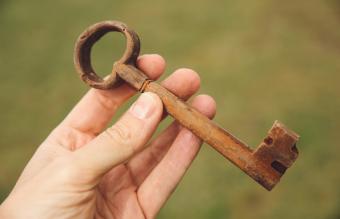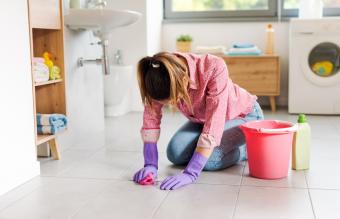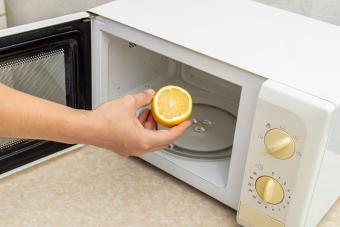
When cleaning your grill, special precautions must be taken so as not to damage the porcelain coating on the grill grates. With proper maintenance, porcelain grill grates can last a long time. If you've invested in a good barbecue grill, these cleaning tips can help keep it looking great for years to come.
Cleaning Porcelain Grill Grates the Right Way
Porcelain grill grates are metal grill racks coated with heavy porcelain. The metal cores consist of either iron or steel, with iron being the preferred material. Iron heats up faster and hotter than steel and provides an ideal cooking surface when coated with porcelain. Manufacturers often use steel in less expensive grills. Both metals are coated with a heavy layer of porcelain. This creates an ideal grill grate - easy to heat, easy to clean. However, after many uses, porcelain grill grates need a good cleaning.
Scrubbing Method
Sometimes all it takes to clean your grates is a little elbow grease.
Materials Needed
For cleaning porcelain grill grates, you'll need:
- A soft surface, such as a piece of plywood or a table covered with a heavy drop cloth.
- Two-gallon bucket
- Warm water
- Dishwashing soap
- Rags
- A soft-bristle brush or an old toothbrush
Instructions
- Fill the bucket with warm water and add a squirt of dishwashing liquid.
- Remove the grill grate from the grill. Hose it off with clean water and then lay it on either a piece of plywood or a thick, folded cloth to protect its surface.
- Dip your rag into the bucket of warm soapy water and scrub the grill surface, making sure you get into all the cracks. If baked on material won't come off with just the rag, switch to a soft bristle brush or an old, soft toothbrush.
- Rinse with clear water and allow to air dry before placing it back on the grill. You can also dry it with a soft towel or a cleaning rag.
Tip: Be careful of brushes with a scraper on the end. Never use scrapers on the surface of a porcelain grill, no matter how baked on the food and grease are on the surface of the grate. The scraper can damage the surface and create splits, cracks, and chips that allow moisture inside, causing damage to the metal core of the grill grate.

Soaking Method
While the scrubbing method is a favorite go-to, you can save your biceps with the soaking method. However, this will take a bit longer.
Gather Supplies
For this method, you'll need:
- Large plastic storage container (30-gallon container works best)
- Warm water
- Soap (preferably Dawn for cutting grease)
- Soft bristle scrubber
- Rag or towel
Instructions
- Blast the grill grates to char any residue for about 10 minutes. Let them cool completely.
- Take the empty storage container and fill the bottom with warm water. Add a couple of squirts of the Dawn.
- Remove the grill grates and place them in the water. Let them soak for 30 minutes to an hour.
- If your container isn't big enough to submerge your entire grate, you will need to flip it.
- Hose off the racks. While you don't want to blast them with a power washer, having a little pressure behind the hosing off can be helpful.
- Lay the grill grate on an old towel. Use the bristle brush and rag to clean off any remaining residue.
- There are special porcelain grill cleaning brushes on the market, like the Weber Grill Brush. They usually have soft brass bristles and are fine for use on the porcelain surface.
- Rinse the racks again and allow to air dry.
Using a Cleaner
While dish soap is a powerful cleaner, sometimes you need something with a little more power. There are two different routes you can go. You can use a commercial cleaner or a natural one. The steps are the same, regardless.
What You Need
For this method, you'll need to get:
- Commercial grill or oven cleaner like Weber Grate Grill Cleaner
- Apple cider vinegar in a spray bottle
- Warm water
- Sponge or towel
- Soft-bristle brush or toothbrush
Instructions
- Give the grates a nice 10-minute blast on the grill to burn off any residue. Allow to cool.
- Remove the grates and set them on a porch or other surface where they can sit and soak in the cleaner.
- Use the vinegar or the commercial cleaner and coat the grates. Allow to sit for 30 minutes to several hours. If using the commercial cleaner, wearing gloves is recommended.
- Using the brush and rag, scrub and wipe down the grate. Using a toothbrush can be helpful for getting those hard to reach edges.
- Rinse the grates with a hose.
- The apple cider vinegar will have a residual smell, but this can be alleviated by blasting the grates for a few minutes before cooking.
Keeping It Clean
Once you've cleaned your grill, you'll want to keep it clean. Rinse grill grates off between uses to prevent food particles and grease from building up on the surface.
Spot Cleaning
Sometimes you don't need to clean the whole grill rack, but just one area. For this, you need soapy water or vinegar and a soft-bristle toothbrush. The toothbrush is best because it is small and can get in those smaller areas more easily than a large bristle brush.
- For the vinegar method, spray the area with the vinegar and let it sit. Use the toothbrush to scrub the area.
- Using soapy water, you want to dip the brush in the soapy water and scrub the area gently. This will loosen up and remove the grim or baked-on scum in that specific area.
Routine Care of Porcelain Grills
Routine care can keep your porcelain grill looking beautiful for many years to come. The porcelain finish protects the metal underneath from rust and corrosion, but if chips develop in the porcelain, water can seep in and create rust. If that ever happens to you, you'll need some tips on how to clean a rusty grill so you can start barbequing again.
Preventing Chips
To prevent chips in porcelain grill grates, never bang them around while cleaning the grill or moving the grill unit. When using metal utensils, work carefully around the grill surface, avoiding a direct and hard hit with metal against porcelain. Avoid cleaning porcelain grills on hard surfaces or laying grill grates onto cement, concrete or other rough and scratchy materials.
Getting It Clean
Cleaning your grill grates doesn't have to come with sweat and tears. With the right tools, you can wipe off grime and charred food that has accumulated during your family BBQs.







